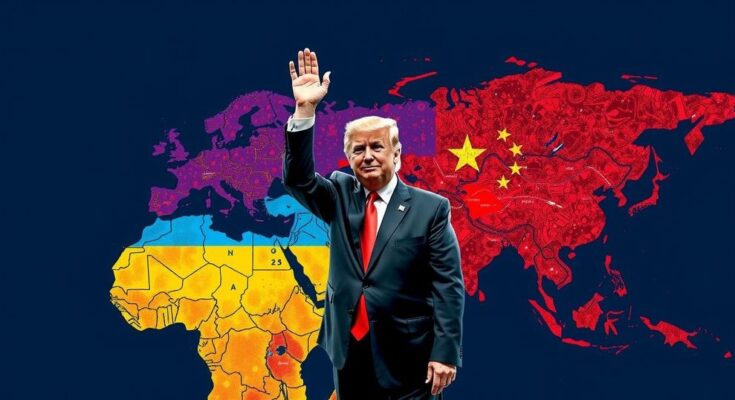Donald Trump’s return could dramatically impact U.S. foreign policy, focusing on non-interventionism and trade protectionism. His strategies may include negotiating peace in Ukraine, continuing aggressive Middle East policies towards Israel and Palestine, and maintaining a confrontational stance towards China. This shift signals potential disruptions in global alliances and geopolitical stability, raising concerns among allies and adversaries alike.
The potential return of Donald Trump to the White House is poised to significantly alter the landscape of United States foreign policy amidst ongoing global conflicts. Emphasizing principles such as non-interventionism and protectionism under the banner of “America First,” Trump’s administration could introduce sweeping changes across various geopolitical hotspots. This assessment draws insight from Trump’s campaign rhetoric and prior tenure (2017-2021), offering a glimpse into his prospective diplomatic strategies towards critical issues involving Ukraine, the Middle East, and China. In the context of Ukraine, Trump has expressed a desire to negotiate peace swiftly, even claiming he could resolve the war with Russia in “a day.” His advisers recommend maintaining military assistance to Ukraine while conditioning such support on engagement in peace talks with Russia. This approach includes the proposal to delay Ukraine’s NATO membership aspirations. Critics argue that this strategy undermines Ukraine’s position and European security. Trump’s views on NATO, characterized by skepticism, raise questions about the future of this defense alliance under his leadership, especially regarding financial commitments by European allies. Regarding the Middle East, Trump aims to replicate his past successes in seeking peace, though specifics remain vague. He has blamed the current hostilities on the Biden administration and maintained that his earlier strategies, including pulling the US from the Iran nuclear deal and enforcing strict sanctions against Iran, prevented escalations. While he enjoys support from Israeli leadership, his policies are seen as having marginalized the Palestinians, leading to increased tensions and instability in the region. The challenge lies in balancing his strong pro-Israel stance with the need for productive dialogue aimed at de-escalation. Concerning China, Trump’s previous administration emphasized a confrontational stance, labeling it a “strategic competitor.” His return could revert to a more aggressive policy, including maintaining tariffs and leveraging economic pressure. Despite his mixed admiration for Xi Jinping, Trump appears set on diverging from the Biden administration’s collaborative regional security strategies, instead favoring unilateral actions that could escalate trade tensions. The future of US-China relations remains uncertain as Trump’s approach might include provocative measures aimed at deterring Chinese aggression towards Taiwan. In conclusion, Trump’s potential influence over US foreign policy signifies a major shift towards isolationist and transactional strategies, affecting relationships with critical global players. His stance on Ukraine, the Middle East, and China illustrates a deep commitment to prioritizing US interests, albeit at the potential cost of traditional alliances and global stability. As such, navigating these complex issues will require astute diplomatic engagement to avert further international crises.
The article discusses the implications of Donald Trump’s potential return to the presidency and its anticipated impact on U.S. foreign policy. With the backdrop of ongoing conflicts in Ukraine, the Middle East, and rising tensions with China, Trump’s prior administration’s strategies and campaign promises reveal a possible direction for his policies. Emphasizing non-interventionism and national interests, Trump’s approach could lead to significant shifts in alliances, defense commitments, and diplomatic negotiations in these critical regions.
In essence, Donald Trump’s potential return to power is anticipated to reshape U.S. foreign policy significantly. His approach hinges on prioritizing American interests and adopting a more isolationist stance, which could disrupt existing alliances and traditional diplomatic relationships. As he navigates the complex geopolitical environments in Ukraine, the Middle East, and relations with China, the repercussions of his strategies will likely extend well beyond U.S. borders, necessitating careful monitoring and strategic responses from other nations.
Original Source: www.bbc.com




